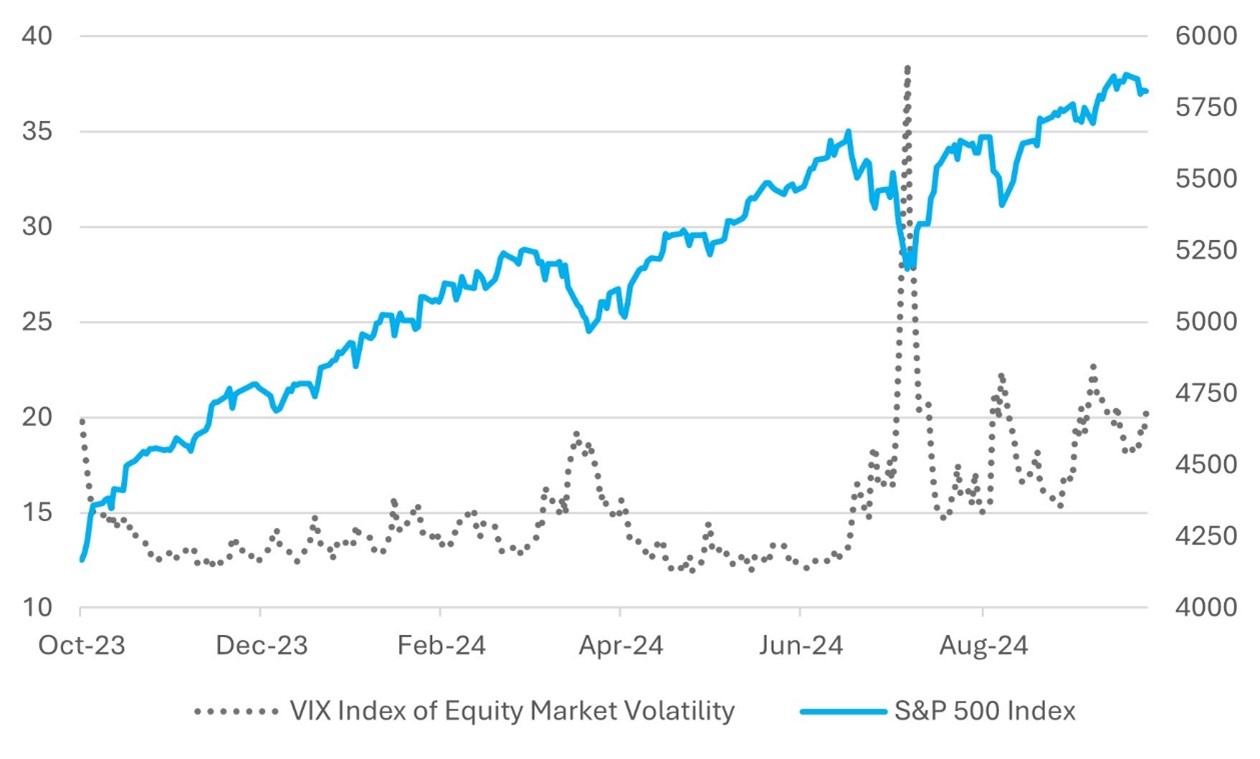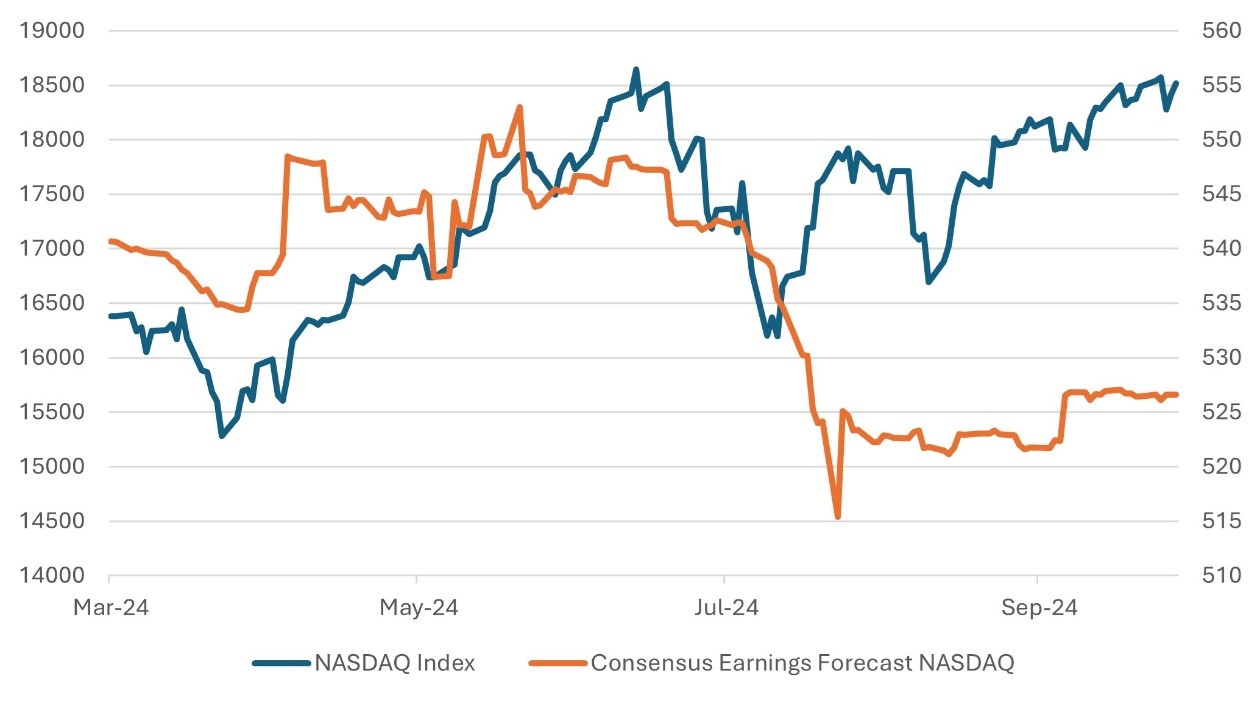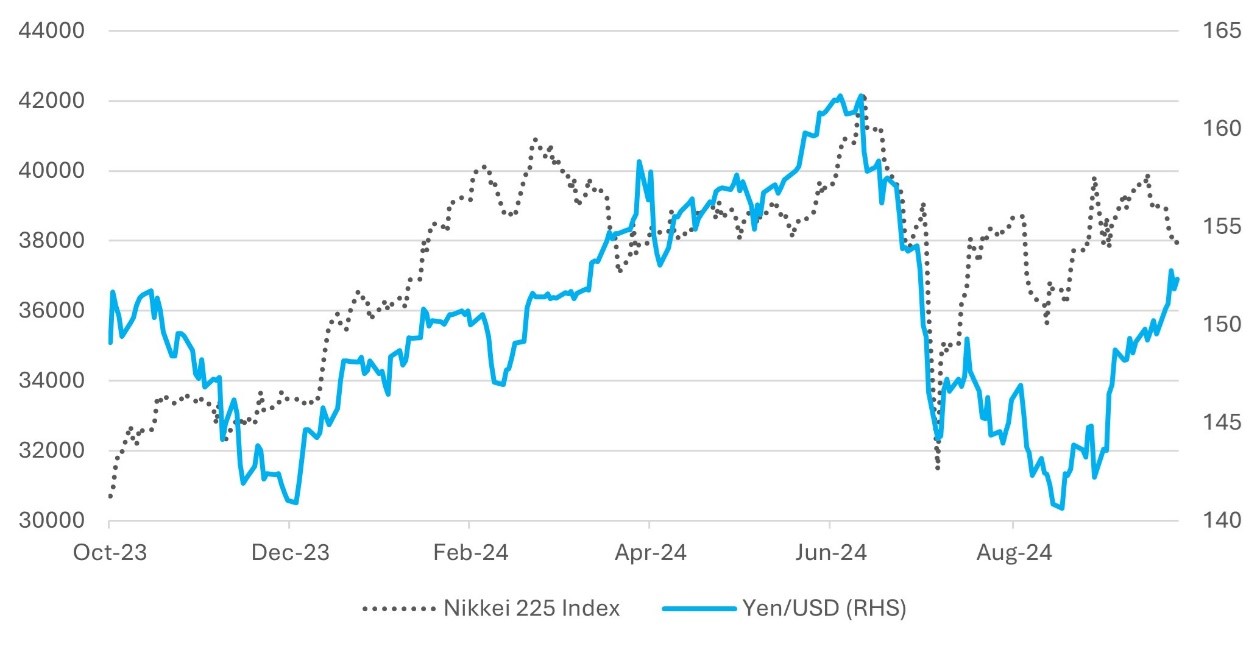By Falco
28 Oct 2024
• Populism at the Forefront: Populism is clearly taking centre stage in the US presidential election
• Debt & Deficit Concerns: The US deficit and debt levels will need addressing—if not now, then at a moment of the market’s choosing
• Volatility Alert: Equity market volatility remains a strong possibility
• US Tech Earnings Outlook: Tech earnings this week could be stable, if current market trends hold
• Political Uncertainty in Japan: Japanese politics face turmoil, with no clear popular leader, casting a shadow over the equity market
Populism clearly Front and Centre of US Presidential Election
Kevin McCarthy, former Republican Speaker of the US House of Representatives, spoke at the annual AIM Summit in Dubai last week. His insights offered a unique perspective on the evolving dynamics of the US presidential elections.
McCarthy provided an interesting take on former President Donald Trump’s more polarising "policies," terming them as strategic bargaining tools rather than rigid doctrine. For example, he suggested that the punitive tariffs threatened on Chinese imports might be less about China’s economic isolation and more about incentivising Chinese investment in US manufacturing facilities. In this light, Trump’s approach could be seen as a negotiation tactic aimed at securing economic gains domestically.
McCarthy’s response to audience concerns about the growing US deficit and national debt was candid: debt becomes a problem only when it destabilises financial markets, at which point it would indeed pose a severe challenge. He lamented the growing influence of populism, especially in the US, which, he argued, often prevents governments from taking necessary steps to address persistent budget deficits and high public debt. Reflecting on this, he cited Senator Mitch McConnell’s advice to Trump: “No one ever lost an election for increasing spending.”

Source: Bloomberg
With just about a week to go to the presidential election on 5th November – and a likely long period after voting day when the results may remain in the balance – equity markets could experience some extra volatility. Indeed, at this point, the equity market does feel vulnerable. Last week the S&P500 fell 1% and looks set for further consolidation. Volatility is on the rise. The VIX index at 20% is up materially from around the 13% average through last year. Some commentators will argue that a few investors want to short the market ahead of a possible Trump victory, but the exact outcome of the election may not be known until mid-December when the electoral college meets.
Chart 1: US Equity Market Stutters While Volatility Rises

Source: Bloomberg
Tech in the headlines this week – But will it be for Good Reasons?
The upcoming week is pivotal for the technology sector, with bellwethers Apple, Meta Platforms, Alphabet, Microsoft, and Amazon set to report earnings. These reports are anticipated to significantly influence market sentiment.
However, recent trends in tech earnings revisions suggest a potentially subdued results season. Notably, over the past three months, there has been a 3% decline in the consensus forecast for 2024 earnings of the tech-heavy NASDAQ Index.
Chart 2: NASDAQ Earnings Forecast has Fallen Over Last Three Months

Source: Bloomberg
Japan is not for populism – But for how long?
The Liberal Democratic Party (LDP) in Japan faces mounting unpopularity, which could hurt both the equity market and the yen in the near term. Although the LDP returned to power in 2012 and has largely maintained its position as the governing party, a series of recent scandals led to the election of a new prime minister. Seeking to consolidate support, the prime minister called a snap election—a move that went awry, plunging the LDP into a political crisis.
Early results to the snap election indicate that the LDP, along with its coalition partner Komeito, has fallen significantly short of a majority. Exit polls suggest that they may secure only 198 of the 465 seats available, far below the 233 needed to govern. Any coalition agreements may require concessions on policies that could be challenging for the LDP to accept, potentially unsettling foreign investors. Additionally, the Bank of Japan could find itself under pressure to manage a weakening yen while resisting rate hikes.
The opposition has mounted pressure by advocating for popular measures such as reducing the sales tax and avoiding tax increases to fund an expanded defence spending. Meanwhile, the Japanese corporate sector has continued to show strength through restructuring efforts, but political change is now taking centre stage, adding further uncertainty to Japan's economic outlook.
In the near term there could be a correction back to 36,000 on the Nikkei 225.
It’s unfortunate that just as Japanese corporations are making notable progress—embracing management practices that would have been unpopular in the past—the political landscape remains uncertain. Such corporate change needs to be supported by reforms at the government level to have lasting impact. Ideally, this period marks another step in Japan's structural evolution toward sustained reform and positive transformation. However, in the short term, financial markets may be wary of a return to politically expedient solutions that simply mask deeper issues. Only time will tell.
Chart 3: Japanese Yen and Equity Market on Watch After Election Result

Source: Bloomberg
Gary Dugan - Investment Committee Member
Bill O'Neill - Non-Executive Director & Investor Committee Chairman
28th October 2024
The information contained within is for educational and informational purposes ONLY. It is not intended nor should it be considered an invitation or inducement to buy or sell a security or securities noted within nor should it be viewed as a communication intended to persuade or incite you to buy or sell security or securities noted within. Any commentary provided is the opinion of the author and should not be considered a personalised recommendation. The information contained within should not be a person's sole basis for making an investment decision. Please contact your financial professional at Falco Private Wealth before making an investment decision. Falco Private Wealth are Authorised and Regulated by the Financial Conduct Authority. Registered in England: 11073543 at Millhouse, 32-38 East Street, Rochford, Essex SS4 1DB
